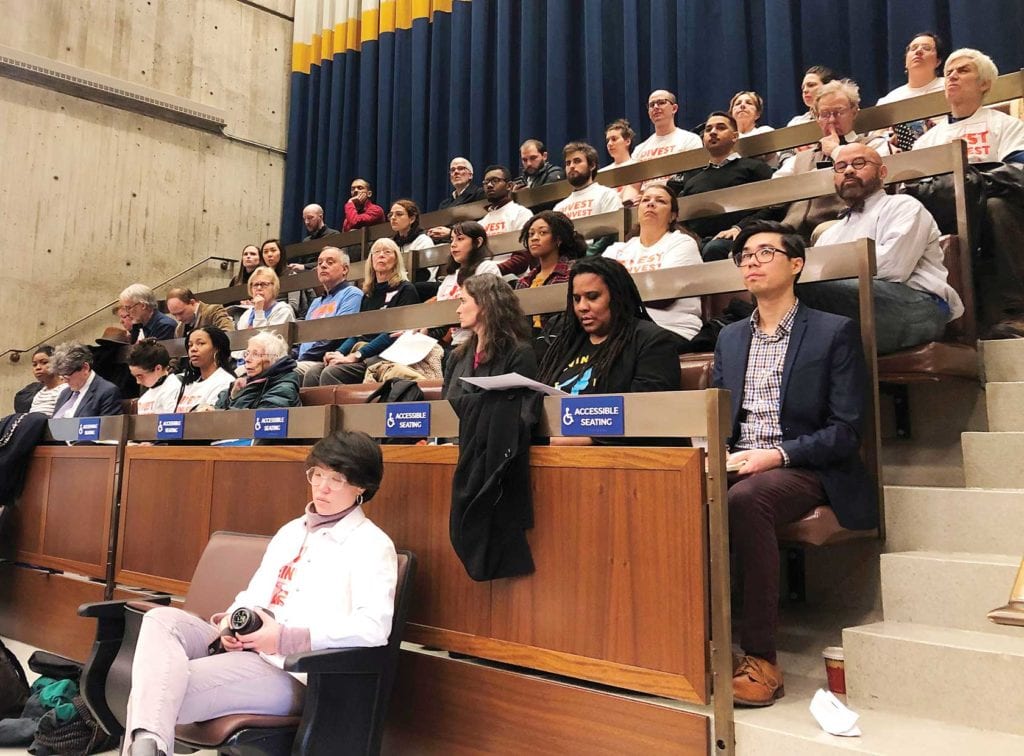Councilors press city on investments
Fossil fuels, for-profit prisons among areas activists targeting for divestment

Boston city councilors are asking the city to rethink its investments to better reflect its values.
At a council hearing Thursday, Councilors Lydia Edwards, Michelle Wu and Matt O’Malley said that they wanted the city to be more transparent about where the money in its pension and treasury funds is invested, and to divest from industries such as fossil fuels, private prisons, student loans and weapons manufacturing.
“It is high time that we defund and denounce the industry that contributes the most to climate change, that funds climate denial and prevents climate action,” O’Malley said in his opening statement.
The councilors emphasized that they wanted not just to divest from harmful industries, but to reinvest the city’s money in renewable energy, affordable housing and other efforts that benefit the community.
Both O’Malley and Wu said that investing in sustainable energy sources would actually be better financially for the city, noting that portfolios that do invest in that industry perform better and that wind and solar energy continue to grow worldwide.
“There is not a choice between the financial health of our investments and the social justice and moral compass of our values,” Wu said. “It will be smarter for our retirees if we move in this direction.”
Local activists wearing shirts that read “Divest, Reinvest” packed the city council chamber to advocate for the causes they cared about.
John Pereira, a Roxbury Community College student and member of College Bound Dorchester who was previously incarcerated, said before the hearing that he was there to ask the council to divest from for-profit prisons, which he believes are deeply flawed.
“The system is designed that way to keep you returning,” Pereira said. “The government has done a lot to keep people like me marginalized. We cannot be profiting off people’s problems.”
Bianca Tylek, an activist with the Corrections Accountability Project, agreed, and noted in the hearing that Philadelphia, Portland, Oregon, New York City and the state of New York have all divested from the prison industry.
“Massachusetts has historically made a number of intentional decisions that demonstrate an effort to steer clear of the prison-industrial complex. For example, there is no bail bonds industry in the state, nor has there ever been a single private prison,” Tylek said. “Yet Boston continues to fund these companies that encourage mass incarceration here and elsewhere and profit from it.”
Other activists spoke about nuclear weapons, surveillance technology, human rights violations in Israel and Palestine, fossil fuels and other issues.
Emme Handy, Boston’s chief financial officer, explained in the hearing that while the city is making strides to invest more in sustainable energy (earlier Thursday, Mayor Martin Walsh announced that the city would invest $150 million in environmentally and socially conscious businesses), it would be difficult to divest completely, as state law governs pension fund investments. Somerville and Cambridge have also recently tried to change their investments but were stopped by the state’s fiduciary committee.
Handy also explained that because many of the city’s investments are in co-mingled funds, it is difficult to divest from specific industries and sometimes even to know what they are invested in.
This would not be the first time Boston has used its investing power for a cause. The city divested its money from companies doing business with apartheid-era South Africa in 1988.
Councilor Edwards expressed her hope that the hearing would start a conversation about where the city should be investing, in the tradition of its historical action against apartheid.
“When we recall about Boston’s role in fighting apartheid, can we think about taking a leadership role today?” Edwards asked. “We’ve done this before. Can we go a step further by not simply asking what we should not do, but asking residents where our money should go?”






